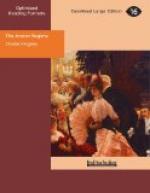And, what is more, men had to punish—to avenge. Those are fearful words. But there is, in this God-guided universe, a law of retribution, which will find men out, whether men choose to find it out or not; a law of retribution; of vengeance inflicted justly, though not necessarily by just men. The public executioner was seldom a very estimable personage, at least under the old Regime; and those who have been the scourges of God have been, in general, mere scourges, and nothing better; smiting blindly, rashly, confusedly; confounding too often the innocent with the guilty, till they have seemed only to punish crime by crime, and replace old sins by new. But, however insoluble, however saddening that puzzle be, I must believe—as long as I believe in any God at all—that such men as Robespierre were His instruments, even in their crimes.
In the case of the French Revolution, indeed, the wickedness of certain of its leaders was part of the retribution itself. For the noblesse existed surely to make men better. It did, by certain classes, the very opposite. Therefore it was destroyed by wicked men, whom it itself had made wicked. For over and above all political, economic, social wrongs, there were wrongs personal, human, dramatic; which stirred not merely the springs of covetousness or envy, or even of a just demand for the freedom of labour and enterprise: but the very deepest springs of rage, contempt, and hate; wrongs which caused, as I believe, the horrors of the Revolution.
It is notorious how many of the men most deeply implicated in those horrors were of the artist class—by which I signify not merely painters and sculptors—as the word artist has now got, somewhat strangely, to signify, at least in England—but what the French meant by artistes—producers of luxuries and amusements, play-actors, musicians, and suchlike, down to that “distracted peruke-maker with two fiery torches,” who, at the storm of the Bastile, “was for burning the saltpetres of the Arsenal, had not a woman run screaming; had not a patriot, with some tincture of natural philosophy, instantly struck the wind out of him, with butt of musket on pit of stomach, overturned the barrels, and stayed the devouring element.” The distracted peruke-maker may have had his wrongs—perhaps such a one as that of poor Triboulet the fool, in “Le Roi s’amuse”—and his own sound reasons for blowing down the Bastile, and the system which kept it up.
For these very ministers of luxury—then miscalled art—from the periwig-maker to the play-actor—who like them had seen the frivolity, the baseness, the profligacy, of the rulers to whose vices they pandered, whom they despised while they adored! Figaro himself may have looked up to his master the Marquis as a superior being as long as the law enabled the Marquis to send him to the Bastile by a lettre de cachet; yet Figaro may have known and seen enough to excuse him, when lettres de




